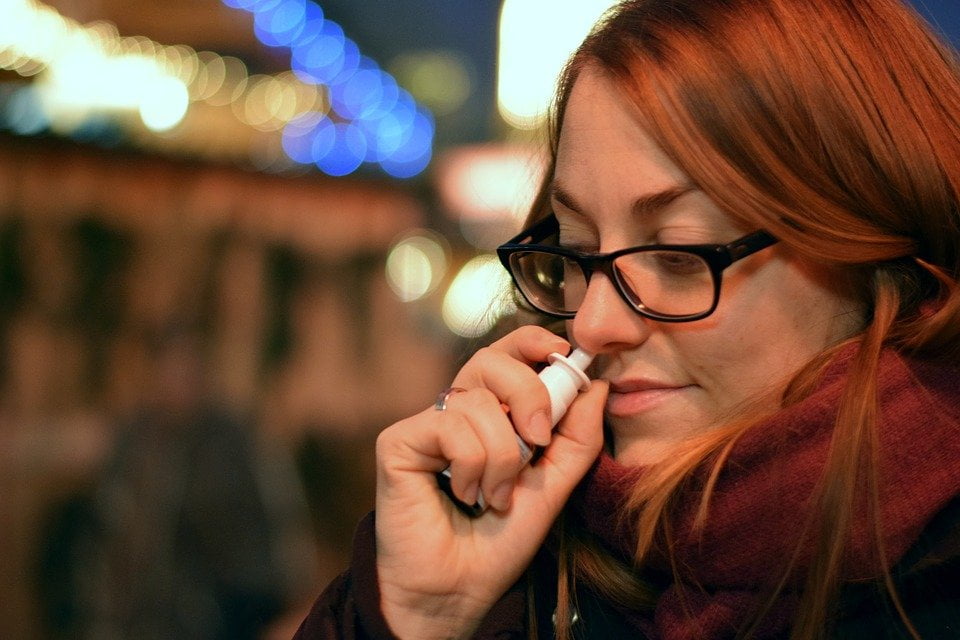Both doctors and patients are confident that taking vasoconstrictor sprays and drops for too long leads to addiction. We decided to check whether this idea has a medical basis.
Specialists write about this side effect of drugs. Media, sites otolaryngological clinics and themselves patients. Latest complainthat long-term use of vasoconstrictor drugs causes such dependence that for normal nasal breathing they require ten or even more times the recommended daily dose. Many also report about psychological dependencies from drugs, forcing them to go to the pharmacy for spray or drops even in the middle of the night.
All vasoconstrictor drugs contain one of the following substances or a combination thereof: naphazoline, oxymetazoline, xylometazoline, phenylephrine. In this material we will not use the trade names of sprays and drops, but will limit ourselves only to their active substance. To correlate a specific nasal spray with one of them, just refer to the “Active ingredient” section in the paper instructions or study the information about the drug, for example, on website "Vidal Directory of Medicines." Vasoconstrictors are broadly called decongestants. By statistics, up to 30% of adults and up to 40% of children experience regular problems with nasal breathing and resort to the use of decongestants.
Nasal turbinates permeated a large number of capillaries and venous vascular sacs. This volume of circulating blood is necessary to warm and humidify the inhaled air. Accordingly, when swelling occurs due to illness or allergies, nasal breathing becomes significantly more difficult. The introduction of local vasoconstrictors, as their name implies, narrows the lumen of blood vessels, reduces the volume of the mucous membrane and makes the nasal passages freer for inhalation and exhalation. In Russia, vasoconstrictor drugs include to over-the-counter medicines, which makes them the first choice in treating various colds and relieving symptoms of allergic diseases.

At the same time, decongestants characteristic tachyphylaxis is a rapid decrease in effectiveness upon repeated administration of a drug and the need to constantly increase its dose. It is most correct to talk about tachyphylaxis, and not about addiction, dependence or “addiction,” in the case of vasoconstrictors. Tachyphylaxis, rather than developing drug addiction, for example, explained the need to constantly increase the dose of morphine in the terminal stages of cancer. It is worth noting that manufacturers of vasoconstrictor drugs usually indicate tachyphylaxis V list side actions.
In case of long-term and significant overdose of vasoconstrictor sprays and drops in the patient develops drug-induced rhinitis. The term is adopted as in Russian-speaking, and in English-speaking field, but is missing in ICD-10 and is not planned for introduction into ICD-11. Since drug-induced rhinitis is accompanied by atrophy, that is, necrosis of the mucous membrane, it is most often coded as “atrophic rhinitis.” Atrophy itself - thinning of the mucous membrane - leads to even greater nasal congestion, therefore, the patient needs to constantly increase the dose to achieve an increasingly shorter period of normalization of nasal breathing. In addition to the occurrence of drug-induced rhinitis, exceeding the dosage of vasoconstrictor drugs Maybe lead to complications such as thrombosis of the branches of the retinal artery, ventricular arrhythmia, presyncope and even strokes.
Although the diagnosis of rhinitis medicamentosa is not included in the ICD, there is enough research to prove its existence and direct connection with the abuse of decongestants. Back in 1996, scientists dialed a group of healthy volunteers: one part of them received a spray with oxymetazoline for a month, the other with benzalkonium chloride (an antimicrobial drug without a vasoconstrictor effect), and the third with a placebo. After 28 days of using the sprays, the first group showed a significant deterioration in the condition of the mucous membrane, and also rated subjective nasal congestion and problems with nasal breathing higher.
Another group of researchers collected turbinate tissue samples from 22 patients using xylometazoline on a regular basis and compared with ten tissue samples from people who did not use vasoconstrictor drugs with this active substance. All 22 samples showed squamous metaplasia, a structural change characterized by the replacement of ciliated epithelium by stratified squamous epithelium. That is, one type of cell literally died and was replaced by another, not intended to provide respiratory functions.
The problem of drug-induced rhinitis is quite common: according to statistics, from 1% to 9% of all visits to otolaryngological clinics connected with drug-induced rhinitis. At the same time, note specialists, the figures are definitely lower than the real number of those who are dependent on drops, since many patients do not consider such dependence a problem that requires contacting a specialist.
However, there is good news - drug-induced rhinitis is completely curable and reversible. To get rid of addiction it is used as a conservative treatment corticosteroids and antihistamines, as well as surgery - for example, vasotomy, dissection of blood vessels, and conchotomy, excision of part of the affected mucous membrane mechanically or by laser or cryodestruction. Surgical treatment carried out at the patient's choice under local or general anesthesia, in many cases - on an outpatient basis, that is, hospitalization is not required. Surgical intervention provides long-term normalization of nasal breathing, provided that the abuse of vasoconstrictor drugs is avoided.
Thus, exceeding daily doses of vasoconstrictor drugs or taking them for a longer duration than recommended actually leads to the formation of dependence on the drug, determined both subjectively by the patient and objectively by the doctor when examining the structure of the tissues of the nasal turbinates. Such pathological changes are called drug-induced rhinitis. However, they are reversible, there are effective therapeutic methods of treatment, and in complex cases, surgical intervention is justified, which significantly makes life easier for the patient.

Is it true
Read on the topic:
If you find a spelling or grammatical error, please let us know by highlighting the error text and clicking Ctrl+Enter.






